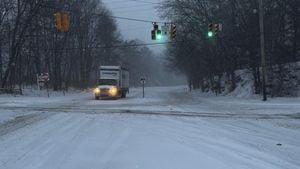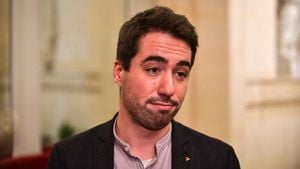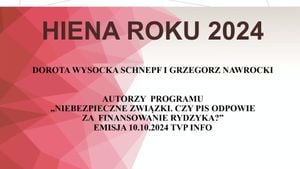A car crashed through a crowd of demonstrators during a union protest in Munich Thursday morning, injuring at least 28 people, some of whom are reported to be seriously wounded. The incident unfolded around 10:30 AM as participants gathered for the Ver.di union's demonstration, which was advocating for higher wages and additional benefits.
The driver, identified as a 24-year-old Afghan asylum seeker, reportedly accelerated his Mini Cooper and sped toward the protesters on Seidlstrasse. This alarming event has sent shockwaves through the city and raised significant questions about public safety and immigration policy.
The local mayor, Dieter Reiter, expressed his shock and concern about the situation. "I am deeply shocked. My thoughts are with the injured," Reiter said during a press conference shortly after the incident. Amid the protests, which included various participants, there were also reports of children among the injured, adding to the gravity of the situation.
Bavarian premier Markus Söder labeled the incident as likely intentional, stating, "This is presumably an attack. Something must change quickly in Germany." His comments come against the backdrop of increasing scrutiny over Germany's immigration policies, particularly concerning asylum seekers who have committed crimes.
The investigation remains active, with police working to determine whether the driver’s actions were deliberate or if he might have accidentally hit the accelerator instead of the brake. Initial reports suggest he was known to law enforcement prior to the incident.
The Ver.di union demonstration aimed to draw attention to workers' rights, including calls for an 8% wage increase, higher bonuses, and additional holiday days. The protest was expected to attract around 2,500 participants, making the event's disruption even more alarming.
Individuals who witnessed the event described terrifying scenes as the car barreled toward them, with many scrambling for safety. "It was horrific. People were screaming and running. We couldn't believe what was happening," said one protester, who wished to remain anonymous.
This incident marks the latest example of how public unrest and security conflate with political tensions, as Germany approaches national elections set to take place soon. Reports indicate the driver of the vehicle, now arrested, had shared pro-Islamist content on social media, prompting discussions among lawmakers about the need for stricter immigration laws.
Chancellor Olaf Scholz condemned the incident as "an awful act," emphasizing the necessity for the perpetrator to face severe consequences. His comments reflected the broader concern over public safety, especially with the upcoming Security Conference involving world leaders, set to kick off shortly after the incident.
Claudia Weber, the local leader of Ver.di, spoke about her colleagues' fears following the attack: "We have many concerns for our colleagues who were present at the demonstration. This is truly alarming when people are simply exercising their right to protest peacefully."
Political reactions have been swift, with calls for changes to Germany's migration policy intensifying, especially from right-wing factions. Alice Weidel, co-leader of the AfD party, stated, "The driver was known to police; changes to migration policy are needed now," illustrating the rising tensions surrounding immigration discussions.
The incident raised questions not only of immediate safety but also broader societal ramifications as officials grappled with security measures leading up to the Security Conference. Munich was already on high alert, with thousands of police deployed to manage potential risks.
Current safety protocols and their effectiveness will be critically examined post-incident, as citizens and officials alike seek reassurance and solutions. Witnesses around the scene expressed their hope for swift action to prevent such concessions luxury from repeating.
The reaction from local authorities emphasizes the need for improved communication and safety protocols within the city as it continues to navigate the complex issues tied to immigration and public safety. The mayor's reflection of deep shock and the premier's urgent policies mirror significant anxiety among the populace.
The focus now turns to the investigation as police work diligently to ascertain the motivations behind the incident and how procedures can be enhanced to protect civilians during public gatherings. The upcoming elections add pressure on political rivals as the discourse on security and public safety intensifies.
With the potential for lasting impacts on Germany’s immigration policy and public sentiment, this incident is bound to serve as a pivotal moment in the nation's current political climate, not to mention the lives altered on this fateful day.



